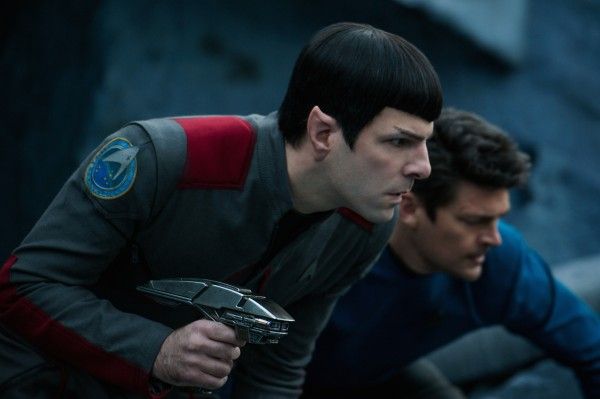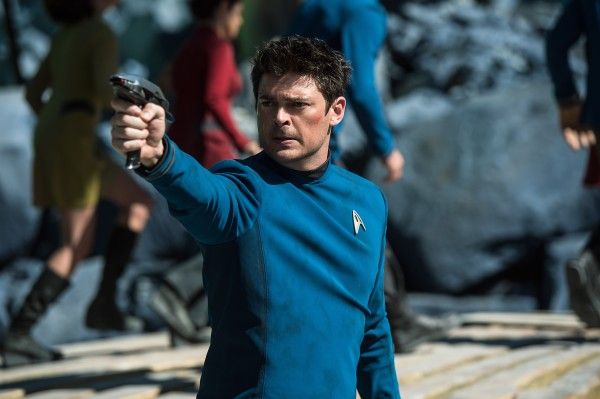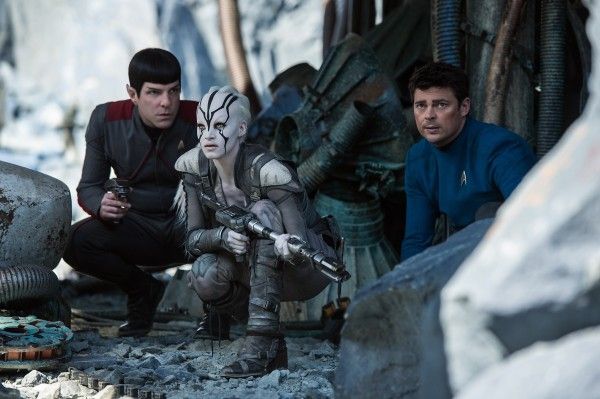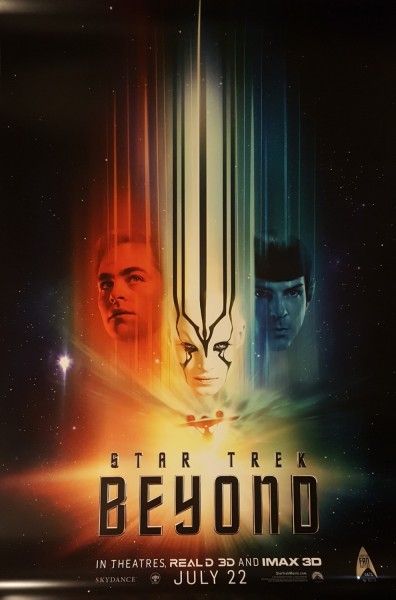It’s become a disheartening trend for reboots to pay far too much homage to their more popular predecessors rather than try to stand on their own feet. The thinking seems to be that if there are enough shout-outs, it will pass for a kind of shibboleth with the fanbase. We’ve seen it with Ghostbusters, Star Wars: The Force Awakens, and we saw it with J.J. Abrams’ Star Trek movies. Oddly, while those movies could drop in references to the Kobayashi Maru or make Khan a villain, those overt references didn’t make Abrams movies feel more like Star Trek because Trek, a 50-year-old franchise that’s spawned six TV series, twelve movies, and countless tie-in novels, is more than the sum of its parts. There’s an essence to Star Trek that’s harder to define. But Justin Lin’s Star Trek Beyond has come closer than any Star Trek film since 1991’s Star Trek VI: The Undiscovered Country to finding that essence.
The Enterprise is in its third year of its five-year mission, and Captain James Kirk (Chris Pine) is starting to feel listless. In his captain’s log, he even notes how life aboard the Enterprise is starting to feel “episodic”, and what’s more, he’s not even sure if he wants a captain’s life or if he’s still living in his father’s shadow. Kirk’s decision is put on hold when, while re-provisioning at the Yorktown starbase, Starfleet receives a distress signal from an alien who claims that her crew is in trouble. The Enterprise rides to the rescue only to be attacked by a swarm that obliterates the ship and scatters the crew on an uncharted world. The crew must figure out how to regroup, get off the planet, and stop the villainous Krall (Idris Elba) from unleashing a powerful weapon.
In an odd way, by lowering the stakes and focusing more on the crew, Star Trek Beyond actually feels more like Star Trek: The Original Series than a slew of fan service could ever provide. Lin, along with screenwriters Simon Pegg and Doug Jung, have found the right balance in showing that they’re Trek fans, but finally establishing that the Kelvin universe is its own place with its own attitude. There are going to be some elements that will never win over die-hard fans and moments of over-reach, but at least Beyond comes off like it’s moving in the right direction for trying to be both Star Trek and a modern interpretation that can manage the tricky balance of appealing to both Trekkies and non-fans alike.
There were those that were worried Lin might try to turn Star Trek into his Fast & Furious franchise, and in a way, he kind of has, but in the best sense possible. Lin has taken his strongest element from the Fast & Furious movies—the emphasis on family and rousing action—and applied it to the Star Trek universe while leaving out Fast & Furious’ dismissal of physics and the objectification of women. For some, this will leave Trek still too action-oriented, which is a valid complaint. While a slightly slower-paced, more sci-fi-minded film would be more in keeping with Trek’s values, I think at this point we have to accept that this new Star Trek universe is an action franchise.
The reason why Beyond works better than the previous two Trek films is because there’s an emphasis on exploration and discovery whereas Star Trek 2009 is about getting the crew together and Into Darkness is about a manhunt/conspiracy. Beyond, while steeped in being a summer blockbuster, feels rooted in the TOS episodes where the crew would find themselves on an alien planet. And while there’s plenty of action, Lin keeps it grounded by finally giving the entire crew their close-up.
By splitting up the crew, it challenges the dynamics we’ve seen before, and the results are delightful. We’ve got Uhura (Zoe Saldana) and Sulu (John Cho) trying to escape from Krall; Scotty (Pegg) and the alien Jaylah (Sofia Boutella) working to repair her ship; Chekov (Anton Yelchin) assisting Kirk; and the best pairing of all, Bones (Karl Urban) and Spock (Zachary Quinto) trying to survive the wilderness. While Spock’s emotional range in these scenes will definitely go too far for some, again, we have to accept that in this universe, Spock is more willing to embrace his human side, and I’m glad that Beyond does it full-heartedly rather than just make Spock a poorly-restrained Vulcan. The chemistry between Spock and Bones is top-notch and they almost steal the movie.
The drawback to putting so much emphasis on action and family is that the movie forgets its initial conflict—Kirk feeling lost in space—and this conflict remains forgotten until almost the end of the movie because it’s tied in with a twist regarding Krall. You have to wait until midway through the third act for a theme to surface. And it’s not a particularly deep theme, but the film is biting its tongue because it doesn’t want to tip its hand with the reveal. However, that means there’s really nothing for Kirk to wrestle with beyond saving the ship. He’s definitely the portrait of a responsible captain here—as opposed to Trek ’09 and Into Darkness—but whereas those films are about Kirk growing into his role as captain, Beyond begins with raising an interesting question: does Kirk even want to be captain? Sadly, that question doesn’t really get explored through the course of the film.
Beyond isn’t ideal Trek, but that’s okay because it’s started to discover its own identity while not casting off the essence of what made Star Trek special in the first place. If you’re deeply entrenched against Abrams’ Star Trek films, Beyond probably won’t change your opinion (although it’s nice to see this new aesthetic without being pummeled by lens flares) because these are action movies now. What makes Beyond impressive is how it’s managed to blend an action aesthetic with enough deep cuts and esoteric references that the film isn’t screaming to remind you it’s Star Trek. The references are still there (and not just from the original Trek, but also Deep Space Nine, Voyager, and Enterprise), but they’re no longer stopping the film in its tracks. By placing the emphasis on the crew and on discovery, the Star Trek film franchise is now boldly going somewhere worth exploring.
Rating: B+





